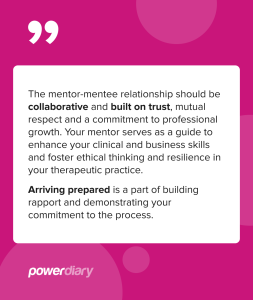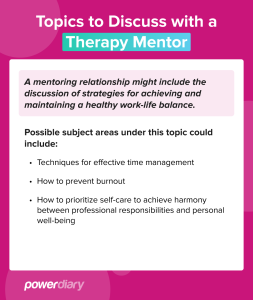Whether at the start of your career as a therapist or many years in, having a mentor can make all the difference for your professional development.
Mentoring is more than just a buzzword; it’s a game-changer. Evidence shows that mental health practitioners with mentors develop enhanced confidence, honed skills, smoother career navigation and an expanded network.
But having a mentor is only the start; it’s about making the meetings with your mentor count.
Focused discussions during these sessions are pivotal to your professional growth, but knowing which questions to ask can be challenging.
In this article, we’ll examine how creating a game plan for your mentor meetings can help you fully leverage your mentor’s wisdom and experience.
Foundational Discussion Topics
The mentor-mentee relationship should be collaborative and built on trust, mutual respect and a commitment to professional growth. Your mentor serves as a guide to enhance your clinical and business skills and foster ethical thinking and resilience in your therapeutic practice.
Arriving prepared is a part of building rapport and demonstrating your commitment to the process. The initial discussions will lay the groundwork for an effective mentoring relationship.
These foundational topics help pave the way for growth and development:
1. Clarify Expectations
Expectation-setting involves clarifying the terms and conditions of the mentoring relationship. This can include the frequency and mode of communication (e.g., in person, over the phone or through video calls).
Establish mutual expectations – what you expect from your mentor and what they expect from you as the mentee.
Here are some example questions you could use to get the ball rolling:
- What are your preferred methods of communication for our sessions?
- How often should meet and communicate?
- What are the confidentiality parameters of our relationship?
2. Set Goals
If you want to achieve specific outcomes from your mentoring relationship, set goals and make a plan. This involves identifying both short-term and long-term career goals and crafting a roadmap to achieve them.
Consider using SMART goal-setting. The acronym stands for Specific, Measurable, Achievable, Relevant and Time-Bound. The idea is to ensure that goals are well-defined, attainable and measurable.
Here’s an example of SMART goal-setting:
- Specific: I will learn to effectively manage my caseload and administrative tasks within work hours to allocate more time for personal activities. Techniques will include prioritization, time management, reducing distractions and the use of digital tools to streamline workflow.
- Measurable: I will reduce my work-related overtime by 10 hours per month. Success will be monitored through a daily log of work hours and activities, reviewed with the mentor to ensure the goal is on track.
- Achievable: The mentor will provide monthly guidance on time management and advice on digital tools that can aid in efficiency. I will also delegate appropriate tasks to support staff where possible, with guidance on how to do so effectively.
- Relevant: Achieving a better work-life balance is crucial for maintaining my mental health, preventing burnout, and improving overall job satisfaction and personal well-being. This goal supports my long-term career sustainability and personal happiness.
- Time–Bound: I will achieve a reduction in overtime hours within 3 months from the start of this mentoring plan. Progress towards this goal will be evaluated bi-weekly, with adaptations made as needed to ensure the target is met.
Here are a few topics to fuel a goal-setting discussion:
- Your short-term and long-term career goals.
- Your ideal outcome for the mentoring relationship, and what milestones you hope to reach along the way.
- How will progress be measured?
3. Identify Strengths & Weaknesses
Self-assessment is the first step toward growth. Reflect on your strengths and weaknesses and acknowledge potential areas for improvement.
Mentors are crucial in providing constructive feedback and guiding you in creating actionable plans to leverage your strengths and buffer your weaknesses.
Here are some example questions you could ask yourself as a springboard for conversation:
- What do I perceive as my greatest strengths and areas needing improvement?
- Which situations do I excel in and why?
- What could I have done differently in a particular situation to improve the outcome?
Deep-Dive Discussion Topics
Deep-dive topics encompass clinical expertise, skill development, work-life balance, and business and practice management.
Clinical Expertise & Skill Development
Clinical expertise and skills development topics might include the following:
- Strategies for continuous learning;
- Ways to use resources effectively;
- Where to find the best continuing education opportunities.
Work-Life Balance for Allied Health Professionals
A mentoring relationship might include discussion of strategies for achieving and maintaining a healthy work-life balance.
Possible subject areas under this topic could include:
- Techniques for effective time management;
- How to prevent burnout;
- How to prioritize self-care to achieve harmony between professional responsibilities and personal well-being.
Example Questions:
- How do you prioritize tasks and manage your time effectively to ensure you meet professional obligations while maintaining personal time?
- What strategies do you use to set and maintain boundaries with clients to prevent work from spilling over into personal time?
- How do you handle situations where clients request support outside scheduled sessions?
- Can you tell me about a time when you felt close to professional burnout?
- What measures have you taken to address burnout, and how do you monitor and maintain your well-being to prevent future occurrences?
Business & Practice Management
In addition to clinical proficiency, proficiency in practice management is vital for success.
If you’re focusing on business and practice management strategies with your mentor, consider the following discussion points:
- How to refine practice workflows;
- How to manage finances and billing efficiently;
- How to hone client communication;
- Top strategies to ensure a thriving allied health practice;
- The best practice management software to streamline productivity and supercharge your business.
Example Questions:
- How do you stay updated with the field’s latest advancements and best practices?
- What resources do you find most beneficial for professional development?
- How can I improve practice workflows and enhance client communication?
- What is a good course for professional development?
- Can you recommend any journals or professional publications you rely on to stay informed about the latest developments in our field? How often do you review them? Do you have an example of how you applied what you learned to your practice?
- Would you recommend particular courses or certifications that could significantly impact my practice?
Conclusion
The key to maximizing the effectiveness of your mentor meetings is to go prepared. Establish clear expectations, set meaningful goals and prepare questions based on relevant topics.
For those embarking on a mentorship partnership or seeking guidance in finding the right mentor, check out our guide to finding a therapy mentor!







